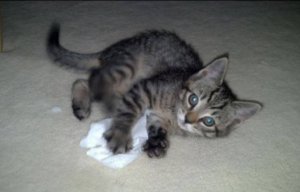The Kitten In The Ceiling
From an employment law perspective, what could some of the consequences be for an office prankster?
 A friend recently told me about an incident at their office. A co-worker of my friend found these tiny speakers (as in slightly larger than a quarter) that when activated would periodically emit the recorded meow of a kitten. The co-worker hid one of the speakers somewhere in the office and turned it on.
A friend recently told me about an incident at their office. A co-worker of my friend found these tiny speakers (as in slightly larger than a quarter) that when activated would periodically emit the recorded meow of a kitten. The co-worker hid one of the speakers somewhere in the office and turned it on.
The next day, everyone kept hearing the kitten meow, but no one could find the it. It would mew at random intervals from an indiscernible location.
At first, people ignored the sound. Then people began looking around wearing questioning looks. As it continued, people began discussing the sound in hushed office tones.

Navigating Financial Success by Avoiding Common Pitfalls and Maximizing Firm Performance
“Is that a cat?”
“Where’s that coming from?”
“Who would bring a cat to the office?”
As time wore on and as it became clear from their inquiries that no one had in fact brought a cat into the office, the workers reached the assumption that there was an actual kitten trapped somewhere in or around the office.
Sponsored

Early Adopters Of Legal AI Gaining Competitive Edge In Marketplace

Is The Future Of Law Distributed? Lessons From The Tech Adoption Curve

Navigating Financial Success by Avoiding Common Pitfalls and Maximizing Firm Performance

Legal AI: 3 Steps Law Firms Should Take Now
A rescue party was formed, and a frantic search commenced. Filing cabinets, drawers, boxes, and anything else in which a kitten could possibly be hiding or stuck were searched.
As the search continued, people began discussing what to do with the tiny cat once it was found. Should it be taken to the Humane Society? Should they keep it at the office kind of like a mascot? One generous spirit finally offered to adopt the cat and take it home once found.
With the kitten’s future secured, the search gained momentum. But to no avail. The wily little devil had really hidden itself good.
“Maybe it’s in the ceiling,” ventured a concerned someone.
With eyes cast skyward, everyone waited for one intrepid soul to take the next step. One brave young rescuer mounted a chair and began removing the ceiling tiles one by one. The ceiling was thoroughly searched. Nothing.
Sponsored

Legal AI: 3 Steps Law Firms Should Take Now

The Business Case For AI At Your Law Firm

Coming up empty in the ceiling and having turned the office upside down but still faced with the incessant cries of the helpless little waif, it became clear that it must be stuck under the building. Where else could it be?
Throwing caution to the wind, the workers began ripping up flooring. Carpet, tile underneath, subflooring, all of it.
Around this time, the prankster who had hidden the tiny speaker knew the prank was going too far. He or she was somehow able to anonymously report that the little feline was just a tiny speaker, a prank taken too far.
I’m going to go out on a limb and assume that the prankster’s co-workers and management were not thrilled. (I’m not sure if the prankster’s identity was ever revealed and, if so, what happened to him/her.) Talk about a prank gone wrong!
If you’ve worked in an office for a while, you’ve probably seen or maybe even involved with a prank or two yourself.
I’ve heard about people’s offices being filled with balloons. I’ve heard about people’s office equipment (including chairs, desks, etc.) being completely wrapped in tin foil or wrapping paper (a relative of mine did that to a co-worker once). Most of the time this is a one-off, good-spirited thing that doesn’t happen again and no one gets offended or upset.
But what about repeat or even serial pranksters? From an employment law perspective, what could some of the consequences be?
First (and most obviously I hope), the prankster can get fired. Even for something good-spirited or light-hearted. There’s no law I’m aware of that protects pranksters from termination.
Second (and maybe less obvious), repeated pranking could create liability for the company (aside from the destruction of company property involved).
Remember on The Office how Jim constantly pranked Dwight? What if Jim instead repeatedly pranked Kelly Kapoor (a Hindu, female Indian-American) or Stanley Hudson (an over 40 African-American)? If it happened with enough frequency and/or was severe enough, one of Jim’s co-workers may have had a viable claim for a hostile work environment against the company.
Look, office pranks can be completely innocuous and result in a good laugh. But always be mindful of the bigger picture and make sure that your pranks (or those of your friends or co-workers) don’t go too far or happen too frequently. A good laugh isn’t worth losing a job over.
 Evan Gibbs is an attorney at Troutman Sanders, where he primarily litigates employment cases and handles traditional labor matters. Connect with him on LinkedIn here, or e-mail him here. (The views expressed in this column are his own.)
Evan Gibbs is an attorney at Troutman Sanders, where he primarily litigates employment cases and handles traditional labor matters. Connect with him on LinkedIn here, or e-mail him here. (The views expressed in this column are his own.)







